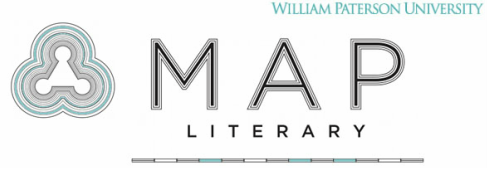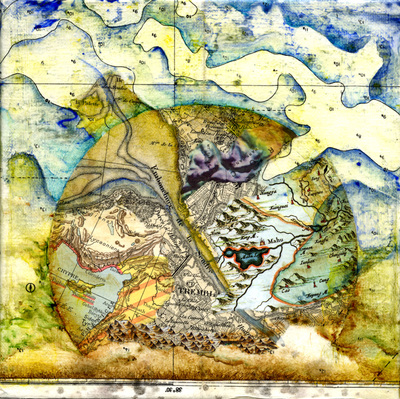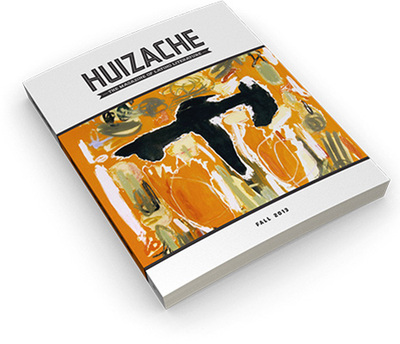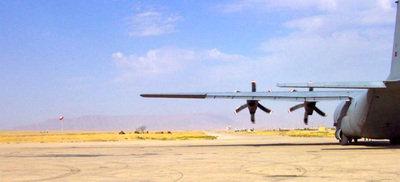SARAH KAHN
Break
YOU REMEMBER THE CREAKING GROAN of the truck and staring for a moment at the whiplashed body of the deer, rolling eye, tongue released from its mouth like a pink lizard, shoulder crunching against the fender. He, at the edge of your sight, slamming into his seat belt; you, who had been sitting with your knees to your chest, no belt, believing for an instant that you would be flung through the windshield into the cold. Imagining its hooves slicing you open and you landing crumpled against it on the roadside, a puppet with the strings cut. You could taste your tongue in your mouth; the iron salt taste not like flesh at all. You remember putting your hand out to brace against the dash. The noise of snapping.
You remember his hand, the maze of his fingerprint, dark buried in the creases, spiraling in. The way his thumb skimmed the skin. The catch of the callouses, the lightness of the touch. Rough and weightless. You didn't pull your hand back; the pain sang like a note springing out from the strained bow of a violin. You stood perfectly still, your back to your father's truck, the seat taller than your shoulder blades, the paint splotched with age spots of rust.
Here, he said when he found the place in your wrist where the bone bent. You thought of the PVC he had laid under the floorboards at a job weeks before, you perched on the ripped-bare beams, watching your father's back, his hands reaching into the dark.
When you think of your father's hands now, you think of them holding your mother to the wall by her throat after she slid the last bills from his wallet, thinking he was still asleep. And when you see them now, 10 years later, they are alien to you, bird-boned and shaking, yellowed from smoking. You are nineteen and these cannot be your father's terrible hands. You think, if. You think, what.
The headlights made a river of light, the world a gray blur at its shores. Your father was a smear in front of you, your glasses dotted with pregnant drops, the ice cold air biting your bone. You, too, were smudged out, and only the things cast in yellow were real. The crows beginning to gather over the deer's corpse, dropping their sharp black silhouettes into the yellow. The crows ripping tiny shreds of flesh from the road kill. You thought of their cool talons piercing the still-warm belly, the tender way they peeled back the fur, picking at the swollen intestine.
He wanted to be careful with you. Rain drummed over the windshield. The truck's doors were flung open and it talked to you, insistent. Ding ding ding. The heat of his scotch breath stung your eyes. He wanted to be careful but the slur of his body was too quick. When he lifted your hand, you felt your arm split. You didn't cry out. You were a man. You were rough and weightless.
At first, you begged him to drive you, but he said no, that you'd have to walk. The cold made the pain in your arm worse. You were soaked through; it would last forever. The truck only a little bent up. Cops'll pull us over, he told you. They'll take you. You shut up fast, stopped whimpering for him to drive.
Your father unzipped his jacket and put his hands under your armpits. Watch the arm, he said. Then he lifted you up, your whole body a soft, hanging shape, only your arm still stiff, thrust high over your head, as far from either of you as you could get it. You were too old to be carried, but you were small for a third grader and your whole body, tucked flat to his chest, fit under his jacket. He left the car dinging at your backs and started walking down the road. You clung to him, your good arm hooked around his neck, while he zipped the jacket over your back.
You have his jacket now. Tried to sell it once and couldn't: too old. You don't feel badly. You think how much smaller his body would look in it now, his muscle sunk flat to his chest. You think of what you could have bought, you think of how you and your girl light a hole in a new life every night. And you think, if, what.
On the walk, you practiced what you'd say. That your mother was driving, that she had stayed with the car, that her sister was going to meet her. That you all had been at a dinner, the boring kind of place with the pink walls and the low lights and the triangle napkins and the gross food where you never went. Your father described it, the silly waiter, the long carpeted hall leading to the restroom, the names for girl and boy in Italian on the doors. You would say that your mother had been driving you home from the restaurant, your father would say what he said to you every day: had a glass with dinner, winding down, though you didn't know from what. You hadn't seen your mother in weeks.
She was still in San Francisco. You knew this because she had come by the week before asking to stay the night and your father had turned her away. She was in a state, he'd told you, and she'd screamed and pounded the door. After she left, you looked for her on the street below your apartment window, temple pressed to the cold glass, but you never saw her walk out of the building. You asked him what he meant by state. Did he mean like a ghost or a phantom or an angel.
He promised you Snickers bars, a trip to Great America, an X-Box. You'll go to the front of all the lines for the rides, he said. We'll get you a bright blue cast. Into the phone, he said, if you want me to help you, you'll say what you have to to keep me out of jail. You heard your mother's voice, faint and tinny through the phone, the rain, but your mother's voice. That sound swept through you, too, lit the nerves and chased the pain out. But she didn't ask to talk to you.
At the hospital, you waited so quietly that the nurses didn't think you were hurt and your father had to go back twice: can you see him yet? When they took you back you sat straight up while the doctor turned your wrist over in his clean, smooth hands. The toughest kid I've ever met, he called you. You grinned up at your dad. He pushed his hand through your hair, messed it all up. The pain had gone from your arm now. You glowed.
When they hung your fingers from the net, a weight around your elbow, and snapped the bone back into place, you held your father's hand tighter but you didn't make a sound. There was still medicine, the plaster for the cast, something else. There was your father, the warm hospital, the nurse and the doctor checking on you again and again. Nowhere to go. Nothing to want.
You made room for your father on the hospital bed and the two of you had a picnic of Doritos and Snickers on the blankets between you. Your wrist was splinted. You'd had a shot in your shoulder and you felt great. You stuck pencils in your splint and pretended they were the arms of a scarecrow. Your father got a deck of cards from a nurse. His breath smelled like the orange flavor of the chips now. He flipped each card over with a clean flick. It was a school night but he said you wouldn't have to go in the morning.
You waited a long time, until you were so sleepy you couldn't see the numbers on the cards, didn't know what hand you'd drawn.
But in the X-Ray room, they made you leave him behind. We have to know whether your bone is straight now, the doctor said. His skin was soft on yours. When he lifted you, you clenched your eyes shut, but he set you down so gently that the pain stayed latent in the marrow. He told you what a good kid you were. You were dizzy, but you didn't want to sleep yet.
Did your dad teach you to be so tough? the doctor asked, turning your hand carefully under the cross-hairs of the x-ray machine. What else has he taught you? Through the glass window in the door, behind the grid of thin black lines, stacked diamonds, you could see the back of a tall man, blocking your father. The doctor’s smooth, pale face looked like the zombies you saw when your father left the TV on at night after he had passed out in his chair. Sometimes you sat between his knees on the floor and watched all night because you liked to hear him breathe. You had nightmares that he’d stop, and no matter how far into his throat you reached, you couldn’t dislodge what was stuck there. You get hurt a lot, tough guy? the doctor said.
You think now, maybe that was God coming for you, sending you someone. You think of your life and this memory is an ember in the ash, one of the only times you remember getting so close to being noticed. Your girlfriend tries to tell you that God is there if you'll look, if you'll ask Him for help, and you tell her that he never was. Now you look back and you wonder. Is this the life you chose.
You sobbed so hard your arm jerked and the pain reawakened, the last spark of it hitting the gasoline of your sorrow. I want my daddy, you pleaded. I want my daddy, my daddy.
Ok, ok, the doctor said, ok, just one more minute, just be still, be a good boy, we're going to take care of you. But you knew what you needed, you knew what it sounded like when adults lied, and you twisted away from him and you didn't care about the bolts of pain in your arm and you wouldn't be still. Your dad might need to talk to a friend of mine, but he'll come back right after, the doctor lied with his sweet, sad voice. Is that ok?
You reached out with your good arm and grabbed the x-ray machine, a huge black camera hanging from the ceiling by a metal arm, and you shoved with your whole body. It swung into the doctor's zombie face.
He jumped back, steadied the x-ray machine, and a balloon of blood inflated over his eye, a drop that grew until it snapped and trickled over his temple. Your scream tore your throat. You were wild, snarling. The doctor swore, his hand over his eye, and went to the door. Hold your boy still, he said to your father, but you went quiet as soon as your father was back in the room. You knew how to barter, you knew not to waste what little capital you had. Your father was beside you and you didn’t care about anything else. Your arm throbbed.
Your father stepped out twice, made two phone calls, but you never let him out of your sight. When he went down the hall to the vending machine, you made him call back and forth to you all the way. Dad. Cole. Dad. Cole. No one came to talk to him, or to you. The tall man didn't come back.
You fell asleep under your father's arm, his breath hot against your hair. When you woke, the fingers sticking out of your blue cast were being held by someone, her long hair skimming your skin. Your father pushed you gently aside and went to your mother. Thank you for coming, he said. I can pay for your bus money."
Cab, she said.
He hesitated. I don't have it.
Whatever you have.
Then your father took your mother's skull in his palm and put his mouth to her ear and it looked as if he were biting it. He said I'm sorry until the words blurred together, his tears got all over his handful of her tangled hair. At least you were with him she said. He's ok. He's ok.
She put her hand on your face. Two fingers of her other hand were still touching your father's forearm. My boys, she said. I've missed you.
You think now that if your father hadn't gotten drunk again the next morning, sitting on the edge of his empty bed. If they had wanted it badly enough: you, delicate featured, soft blond hair, pretending to sleep between them, your grin playing on your still face. If she had stayed. If you had been good, had let them talk to your father, to you; if you had been gone; if she had had time to imagine losing you. What.
You think now of how young she was, 26, the oldest she would ever be.
You think of her hands, of how when you looked into the casket—ten years old, just tall enough to see--you'd seen that no one had hidden the dark dots where needles had slid between the fingers, of how you had tried to reach in and turn her hands before anyone saw, though you didn't know yet exactly what they were, only that they were something she hated, only that they had killed her. You think now of the phrase track marks. You think of tracks dotting her skin. The one iron rail the train of her life could follow, the train of yours; you think of opening the door on your mother on the bathroom floor, tonguing a spot of blood from a dark scar; you think of how it must have tasted, nothing like flesh. You think now of how she tugged the sleeves of her shirts down past the knuckles to hide them. When. Before.
You thought that night that no one had ever loved anyone so much. That one day you would love a woman and keep her safe. You wouldn't ever let her out of your sight. You'd tell her that if she left you, you would kill her.
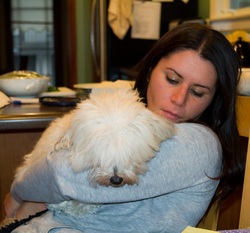
Sarah Kahn is pursuing an MFA in fiction from the University of Montana. Her work has appeared in Cobalt Review.
